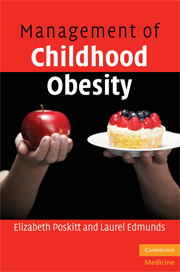Book contents
- Frontmatter
- Contents
- Foreword by David W. Haslam
- Preface
- Acknowledgements
- List of abbreviations
- 1 Introduction
- 2 How fat is fat? Measuring and defining overweight and obesity
- 3 Where should overweight/obese children be managed?
- 4 How do we approach the overweight/obese child and family?
- 5 The clinical assessment: what are the special points?
- 6 What complications should we look for now and later?
- 7 How does psychology influence management?
- 8 Management: what do we mean by lifestyle changes?
- 9 How can we reduce energy intake?
- 10 How can we increase energy expenditure?
- 11 What else can be done?
- 12 How can we sustain healthy weight management?
- 13 What can we do to prevent childhood overweight and obesity?
- References
- Index
3 - Where should overweight/obese children be managed?
Published online by Cambridge University Press: 08 August 2009
- Frontmatter
- Contents
- Foreword by David W. Haslam
- Preface
- Acknowledgements
- List of abbreviations
- 1 Introduction
- 2 How fat is fat? Measuring and defining overweight and obesity
- 3 Where should overweight/obese children be managed?
- 4 How do we approach the overweight/obese child and family?
- 5 The clinical assessment: what are the special points?
- 6 What complications should we look for now and later?
- 7 How does psychology influence management?
- 8 Management: what do we mean by lifestyle changes?
- 9 How can we reduce energy intake?
- 10 How can we increase energy expenditure?
- 11 What else can be done?
- 12 How can we sustain healthy weight management?
- 13 What can we do to prevent childhood overweight and obesity?
- References
- Index
Summary
Management of overweight and obesity in childhood or in adult life begins within the home. For those who find it easy – for whatever reason – to control their weight gain, changes in energy intake and output initiated from home may be all that are necessary to regain normal weight and fatness (Poskitt 2002). For those who need more support than can be provided within the family environment the questions then arise where and by whom should help be provided?
In the UK, policies for the management of the obese child have not been widely developed although there are some guidelines for primary and secondary care (Royal College of Paediatrics and Child Health (RCPCH) 2002; Scottish Intercollegiate Guidelines Network (SIGN) 2003; National Institute for Health and Clinical Excellence (NICE) 2006). There are few paediatricians with specialist experience in managing obese children. In the community and in hospitals the problem is much the same – who has the experience, skills, time, interest and suitable facilities to provide effective support and care for overweight children and their families?
Who should manage these children?
Most obese children are not ‘ill’ in the usual sense. Should they be managed within the health services at all? More and more obese children are now being recognized with co-morbidities of obesity. The potential medical consequences of uncontrolled obesity with the prevalence found in the west today are monumental.
- Type
- Chapter
- Information
- Management of Childhood Obesity , pp. 33 - 45Publisher: Cambridge University PressPrint publication year: 2008



